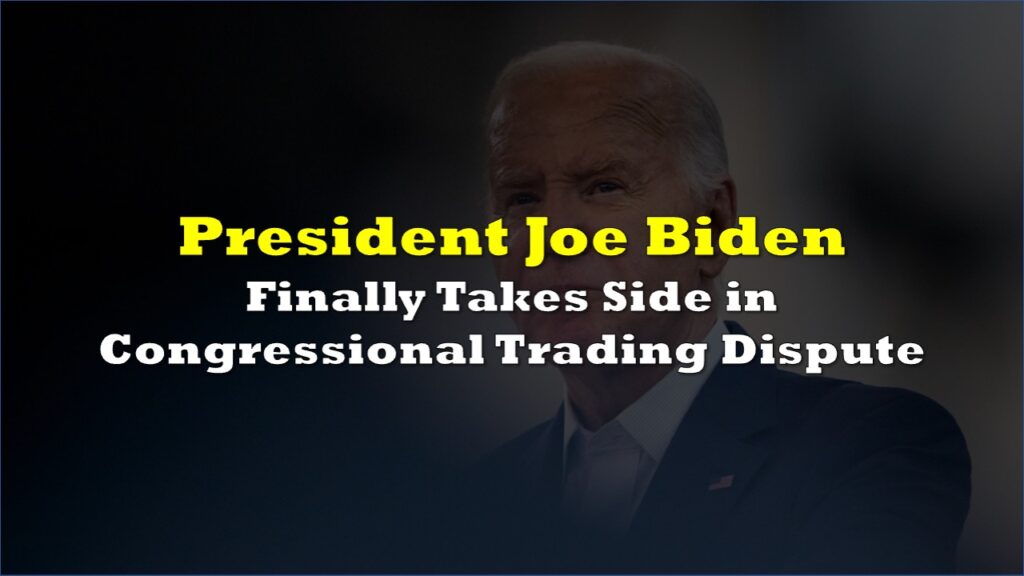President Joe Biden issued his first veto of his presidency on Monday, signaling a shift in White House relations with the new Congress since Republicans took control of the House in January — a move that could pave the way for larger battles with GOP lawmakers over government spending and the nation’s debt limit.
Biden attempted to derail a Republican-sponsored bill that would prohibit the government from taking into account environmental concerns or prospective litigation when making investment decisions for retirement plans. Biden stated in a White House video that he vetoed the bill because it “put the retirement savings of individuals across the country at risk.”
“The legislation passed by the Congress would put at risk the retirement savings of individuals across the country. They couldn’t take into consideration investments that would be impacted by climate, impacted by overpaying executives,” Biden said in an Oval Office video released by the White House. “And that’s why I decided to veto it.”
Republicans have railed against “ESG” investing, which stands for “environmental, social, and governance,” claiming that it prioritizes allocating money based on liberal political causes, such as efforts to combat climate change and divest from fossil fuels, over earning the best returns for retirement accounts.
This is a deeply dishonest framing of what Biden did today. Before Biden’s Dept of Labor rule change, retirement fund managers could consider *only* investment returns. Now, Biden permits them to take into account “collateral benefits other than investment return” including… https://t.co/fhh8AOn1zb
— Vivek Ramaswamy (@VivekGRamaswamy) March 20, 2023
His first veto marks a more combative stance near the midpoint of Biden’s presidency, as he faces a Republican-controlled House determined to erase elements of his policy legacy and investigate his administration and family. To make it more difficult for Biden, numerous Democratic senators are up for re-election in conservative states next year, providing them political motivation to put some distance between themselves and the White House.
“Your plan manager should be able to protect your hard-earned savings — whether Rep. Marjorie Taylor Greene likes it or not,” Biden said in a tweet, referring to the far-right Georgia congresswoman who has made opposition to progressive ideas her political brand.
I just vetoed my first bill.
— President Biden (@POTUS) March 20, 2023
This bill would risk your retirement savings by making it illegal to consider risk factors MAGA House Republicans don't like.
Your plan manager should be able to protect your hard-earned savings — whether Rep. Marjorie Taylor Greene likes it or not. pic.twitter.com/PxuoJBdEee
The proposed measure would have effectively maintained a Trump-era prohibition on federal managers of retirement plans considering concerns such as climate change, societal repercussions, or current lawsuits when making investment decisions.
The veto could also help quell environmentalists’ rage at the Biden administration’s recent decision to approve the Willow oil project, a big and contentious drilling project in Alaska.
Yet, detractors argue that so-called environmental, social, and governance investments allocate money based on political agendas, such as fighting climate change, rather than achieving the highest returns for savers. Environmental and social factors in government investments, according to Republicans who backed the bill, are merely another example of being “woke.”
“In his first veto, Biden just sided with woke Wall Street over workers,” House Speaker Kevin McCarthy tweeted on Monday. “Tells you exactly where his priorities lie.”
Biden’s veto is unlikely to be overruled. Only three Democrats in Congress backed Republicans in the matter — one in the House and two in the Senate — making it improbable that a two-thirds majority in both chambers could be gathered to override Biden’s veto.
“This administration continues to prioritize their radical policy agenda over the economic, energy and national security needs of our country, and it is absolutely infuriating,” Senator Joe Manchin, one of the two Democrats in the senate who supported the bill, said in a statement.
This veto was totally appropriate.
— Chuck Schumer (@SenSchumer) March 20, 2023
For House Republicans to tell American companies they cannot pursue profits and societal goals when they wish to would be counterproductive and un-American.https://t.co/rsAaIFVaDo
The administration first indicated that Biden would oppose a Republican-authored resolution that would override a crime measure passed by the District of Columbia Council, but the president later stated that he would sign it, which he did on Monday. Biden also signed legislation directing the federal government to declassify information on the origins of COVID-19.
According to the American President Project at the University of California, Santa Barbara, Biden’s immediate predecessor, Donald Trump, vetoed 10 laws during his term in office, while Barack Obama vetoed 12. One veto in each administration was overturned by Congress.
Information for this briefing was found via Associated Press, The Guardian, and the sources mentioned. The author has no securities or affiliations related to this organization. Not a recommendation to buy or sell. Always do additional research and consult a professional before purchasing a security. The author holds no licenses.









